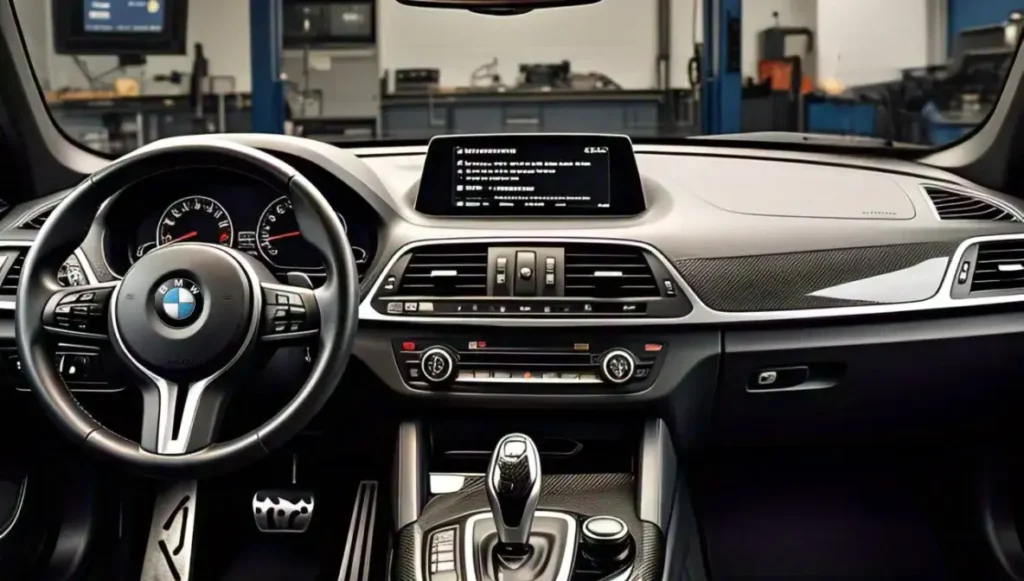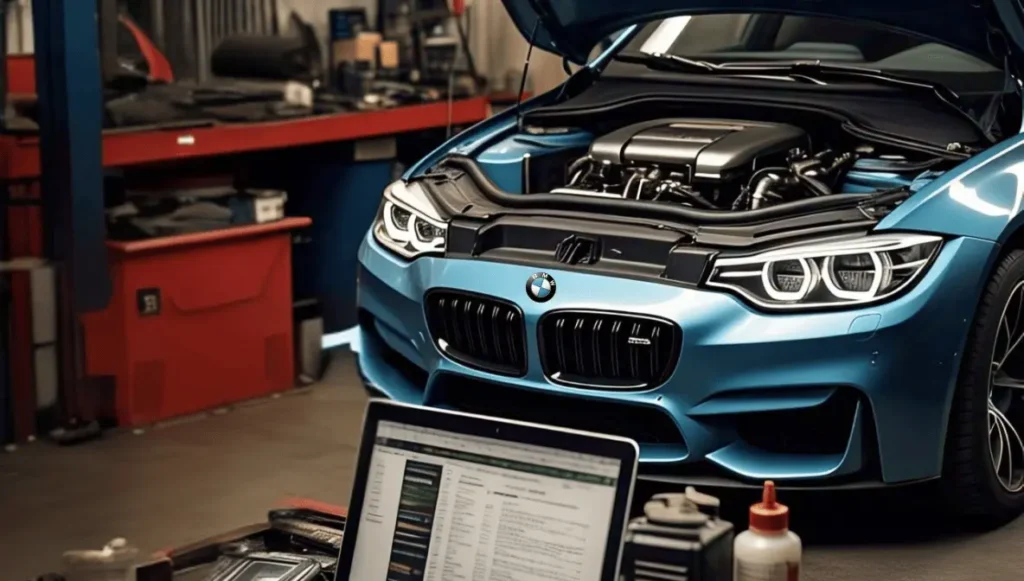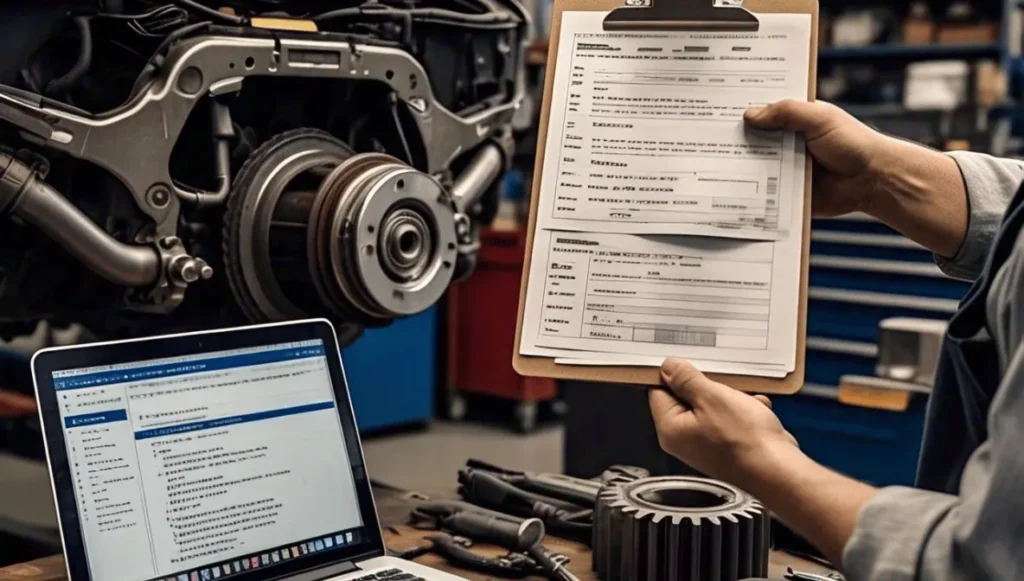Introduction
If you’re driving a BMW and you see the dreaded Drivetrain Malfunction BMW warning light flash on your dashboard, you might feel a rush of panic. It’s an ominous message, but understanding what it means can help you stay calm and take the right steps to address the issue. In simple terms, a drivetrain malfunction indicates something isn’t quite right with the system that transfers power from your BMW’s engine to its wheels. The drivetrain comprises key components like the transmission, driveshaft, differential, and sometimes the torque converter – all of which work together to give you that smooth, powerful BMW drive.
Addressing the “drivetrain malfunction BMW” early can save you time, money, and frustration. The longer you wait, the more damage can be done – and small, relatively inexpensive fixes could turn into major, costly repairs if the issue isn’t resolved quickly. By diagnosing the problem early, you can catch minor issues before they snowball into something more serious, potentially saving you from expensive repairs and keeping your BMW running like it should.
In the following sections, we’ll explore the causes of “drivetrain malfunctions BMW“, how to diagnose them, and what you can do to keep your car running smoothly for years to come. The key is early intervention—when it comes to drivetrain problems, the sooner you act, the better!
Table of Contents
What is a Drivetrain Malfunction BMW?
To understand the meaning behind a drivetrain malfunction, it’s helpful to know what the drivetrain itself is. In simple terms, the drivetrain, is a responsible system for transferring the engine’s power to the wheels, allowing your car to move. It includes several vital parts, such as the transmission, driveshafts, differential, axles, and even the clutch in manual vehicles. All of these components need to be in top shape to ensure a smooth driving experience in your BMW.
In a BMW, which often features performance-oriented design, the drivetrain’s efficiency is key to providing you with the responsive, smooth, and powerful ride that the brand is known for. When something goes wrong in the drivetrain, it can quickly turn your driving experience from luxurious to frustrating.
Warning Signs of a Drivetrain Malfunction BMW
So, how do you know when something’s off with your drivetrain? There are a few warning signs that could signal a malfunction:
- Warning Lights: If your BMW’s dashboard lights up with a “Drivetrain Malfunction” message, it’s a direct alert that something isn’t quite right. This warning might be accompanied by other lights, such as the check engine light, indicating a more serious issue.
- Strange Noises: Unusual sounds like grinding, whining, or clunking noises when accelerating or decelerating could indicate a problem within the drivetrain. These noises are often signs that one or more parts are failing to operate smoothly.
- Reduced Performance: One of the most noticeable symptoms is a sudden drop in performance. You may experience sluggish acceleration, difficulty shifting gears, or erratic power delivery. In some cases, you might also feel vibrations or shuddering when driving, especially when accelerating or going uphill.
Impact on Vehicle Performance
A malfunctioning drivetrain can have a significant effect on your BMW’s performance. Here’s how it could affect your driving performance:
- Poor Acceleration: The drivetrain is responsible for transferring power from the engine to the wheels. If something’s wrong, you may notice your car struggles to accelerate, or it feels like it’s not responding as quickly as it used to.
- Vibrations and Shaking: If the drivetrain components, such as the driveshaft or differential, are malfunctioning, you may feel vibrations or shaking in the car, particularly when accelerating or driving at higher speeds.
- Transmission Issues: Since the transmission is a key part of the drivetrain, any issues with it can lead to difficulty shifting gears or even complete failure to engage gears properly, making your car feel unresponsive or stuck.
- Decreased Fuel Efficiency: A malfunctioning drivetrain can also cause your BMW to consume more fuel than usual, as the engine works harder to compensate for the system’s lost efficiency.
If you notice any of these symptoms, it’s essential to have your BMW checked out by a professional mechanic. Ignoring drivetrain issues can lead to more extensive damage and costly repairs down the road.

What Causes Drivetrain Malfunction BMW?
A “Drivetrain Malfunction” in your BMW can be a pretty alarming warning. The drivetrain is a complex system, and when something goes wrong, it can affect the performance of your vehicle in several ways. So, what exactly causes this issue to pop up? Let’s break down some of the most common reasons for a “drivetrain malfunction BMW“.
Transmission Issues
One of the top causes of your “drivetrain malfunction BMW” is a problem with the transmission. The transmission is what helps shift gears and ensures that power from your engine gets properly distributed to the wheels. If your transmission is faulty or there’s an issue with low transmission fluid, it can trigger a malfunction. Low fluid levels can cause overheating and poor shifting performance, which might make your BMW feel sluggish or unresponsive. In some cases, a failing transmission can even result in the drivetrain malfunction warning lighting up on your dashboard.
Torque Converter Problems
Another culprit in causing a “drivetrain malfunction BMW” is a faulty torque converter. This part connects the engine and transmission and regulates the power transfer. When it fails, you might feel your BMW jerk or struggle to accelerate smoothly, especially during gear shifts. This can be especially noticeable in automatic BMW models. A malfunctioning torque converter can create rough transitions between gears, making your driving experience uncomfortable and prompting the drivetrain warning to appear.
Sensor or ECU Failures
Modern BMWs rely heavily on sensors and the engine control unit (ECU) to keep the drivetrain running smoothly. If any of the sensors misbehave or the ECU gets confused, it might trigger a false message on your drivetrain malfunction BMW. For instance, if a sensor detects incorrect data from the transmission or other drivetrain components, the ECU might assume there’s a bigger problem than there is. This could result in erratic performance or an error message, even if no major mechanical issues are at play.
Differential or Shaft Problems
Finally, issues with the differential or driveshaft can also contribute to a drivetrain malfunction. The differential is in charge of distributing power to the wheels, especially when turning. If it becomes damaged, you might hear odd noises like whining or grinding, or feel vibrations during your drive. The driveshaft, which connects the transmission to the wheels, can also be a weak point. If it gets damaged or worn out, it can lead to vibrations, power loss, or even cause the vehicle to feel unsteady.
Note: When any of these components malfunction, it can cause your BMW’s drivetrain to underperform, affecting everything from acceleration to handling. If you’re seeing a “Drivetrain Malfunction” warning, it’s a good idea to have your vehicle inspected by a professional to get to the bottom of the issue. Identifying the problem early can save you from more costly repairs down the road.

How to Fix Drivetrain Malfunction BMW?
If you’re seeing a “Drivetrain Malfunction BMW” warning, it can be unsettling. But don’t worry! Before you head straight to the shop, there are a few steps you can take to troubleshoot and potentially fix the issue yourself. Let’s dive into what you can do to address a drivetrain malfunction in your BMW.
DIY Troubleshooting Tips
Here are some basic things you can check to get a better idea of what’s causing the drivetrain malfunction:
- Check Transmission Fluid Levels: One of the most common reasons for the “drivetrain malfunction BMW” is low or dirty transmission fluid. If your fluid is running low, it can cause the transmission to overheat, leading to poor shifting or even a failure to shift gears. Make sure your fluid is at the correct level, and if it looks dirty or smells burnt, consider changing it.
- Inspect the Warning Lights: Pay close attention to any other warning lights that may show up on your dashboard. In addition to the “Drivetrain Malfunction” message, look for any check engine lights or specific alerts that could point to a particular issue with your transmission, engine, or sensors.
- Reset the System: Sometimes, the “Drivetrain Malfunction BMW” warning might appear due to a temporary glitch. Turn off your BMW, wait a few minutes, and restart it to see if the warning resets. If the issue is minor, the system may clear itself. However, if the warning comes back, you’ll need to investigate further.
Using BMW’s Diagnostic System
BMWs come with advanced diagnostic tools, and if you own a model with iDrive, you can use it to check for issues. iDrive can run a diagnostic test and show you error codes that indicate what might be causing the drivetrain malfunction BMW message. These codes can be incredibly helpful in narrowing down the problem.
For a more thorough diagnosis, you can also take your BMW to a service center or use a specialized BMW scan tool to read the fault codes directly from the vehicle’s ECU (engine control unit). This will give you more specific information on which part of the drivetrain is malfunctioning, whether it’s the transmission, torque converter, or something else.
When to Seek Professional Help
While DIY troubleshooting is a great first step, there are times when a drivetrain malfunction BMW requires professional attention. If you’ve checked the basics—like the transmission fluid—and the warning light persists, or if you notice other signs like rough acceleration, strange noises, or vibrations, it’s time to get your BMW into a shop.
Professional technicians can perform more in-depth diagnostics and offer solutions that go beyond what you can do at home.
Common Repair Solutions
If the issue is something straightforward, like low fluid, the fix may be as simple as topping up or replacing the fluid. However, in more complex cases, you might need the following repairs:
- Replacing Transmission Fluid: If your transmission fluid is low or contaminated, replacing it can solve the problem and restore smooth shifting.
- Sensor or ECU Repair: If a faulty sensor or a malfunctioning ECU is causing the drivetrain to malfunction, replacing the sensor or repairing the ECU could fix the issue and prevent further error messages.
- Torque Converter Replacement: A faulty torque converter can be a more significant issue and might require full replacement to ensure smooth gear transitions and avoid jerking or hesitation when accelerating.
- Differential or Driveshaft Repairs: If the differential or driveshaft is damaged, it may need to be repaired or replaced to prevent further drivetrain damage and restore your BMW’s performance.
Note: Dealing with a “drivetrain malfunction BMW” can be frustrating, but by following these steps, you can either fix the issue yourself or get a clearer picture of what’s wrong so that you can seek professional help. Don’t wait too long to address drivetrain issues—fixing them early can save you from costly repairs down the road.

Drivetrain Malfunction BMW Cost
If you’ve encountered a “Drivetrain Malfunction BMW” warning, you’re probably wondering how much it’s going to cost to fix the issue. While the price can vary depending on the specific problem, model, and where you take your vehicle, here’s an idea of what you might be looking at for diagnosis and repairs.
Cost of Diagnosing the Problem
The first step when dealing with your “drivetrain malfunction BMW” is getting a proper diagnosis. BMW dealerships or trusted auto repair shops will typically charge for a diagnostic service. This usually involves plugging your car into a computer system to read error codes from the ECU and determine the source of the issue. On average, diagnostic fees range from $100 to $200, though they can be higher at a dealership due to their specialized equipment.
If you’re getting it done at an independent mechanic, the cost might be on the lower end of that range. Just keep in mind that some shops will apply the diagnostic fee to your final bill if you decide to go ahead with repairs.
Repair Costs for Common Drivetrain Malfunction BMW Issues
Once the issue is identified, the repair costs can vary based on what’s wrong. Here are some of the more common drivetrain problems and their typical price ranges:
- Transmission Issues: Transmission repairs are among the most expensive, especially if there’s a major problem like a transmission rebuild or replacement. On average, you could be looking at anywhere from $1,500 to $4,000 or more. Smaller issues, like fixing a sensor or replacing fluid, may be cheaper—ranging between $200 and $800.
- Torque Converter Repairs: Replacing a faulty torque converter can be a costly repair. Depending on the BMW model and labor rates, you might be looking at a bill between $1,000 and $2,500. This repair typically requires removing the transmission, so it’s a more labor-intensive job.
- Differential Issues: If your BMW’s differential is failing, repair costs can range from $500 to $2,000, depending on whether it’s just a small part replacement or a complete differential overhaul. This repair typically involves disassembling parts of the drivetrain to access the differential, which is why it can be pricey.
Factors Affecting Repair Costs
Several factors can impact the overall cost of fixing the “drivetrain malfunction BMW“. These include:
- BMW Model: The specific model of your BMW can play a big role in pricing. High-performance models or luxury vehicles (like the M series or 7 series) tend to have more complex drivetrain systems and more expensive parts, which can increase repair costs.
- The complexity of the Issue: Some drivetrain problems are straightforward and quick to fix, while others might be more complicated. A simple fluid change or sensor replacement will be much cheaper than having to rebuild or replace major components like the transmission or torque converter.
- Labor Rates: Labor rates can vary depending on where you take your car for repairs. Dealerships often have higher labor rates due to their specialized knowledge of BMWs, while independent mechanics may offer lower rates. However, the quality and expertise you need to fix a BMW drivetrain issue are worth considering, so make sure you’re choosing a reliable repair shop.
Is It Worth Repairing or Replacing?
When it comes to drivetrain issues, you may find yourself asking whether it’s worth repairing a certain component or just replacing it entirely. For example:
- Transmission: If the transmission has major internal damage, a rebuild or replacement might be necessary. If your BMW has high mileage (over 150,000 miles) and the cost of repair is close to the price of a replacement, it might make more sense to go for a new or refurbished transmission to avoid future issues.
- Torque Converter: If your torque converter is failing, replacing it is often the most cost-effective solution, as rebuilding or repairing it is usually not feasible.
- Differential: Depending on the severity of the issue, you might be able to repair or replace the damaged parts of the differential without needing a full replacement. However, if the housing or internal components are damaged significantly, replacement may be the only option.
In the end, while the cost of fixing a drivetrain malfunction BMW can add up, knowing what to expect and understanding the factors that influence pricing will help you make an informed decision. Always get a few quotes and consider both repair and replacement options to find the most cost-effective solution for your vehicle.

How to Prevent Your Drivetrain Malfunctions BMW
Nobody likes seeing the dreaded “Drivetrain Malfunction” warning pop up on their BMW’s dashboard. Fortunately, there are several proactive steps you can take to keep your drivetrain running smoothly and avoid costly repairs down the line. Here’s how you can protect your BMW’s drivetrain and keep it in top shape.
Regular Maintenance and Inspections
The best way to prevent the “drivetrain malfunction BMW” is to stick to a regular maintenance schedule. Regular inspections and servicing are crucial for catching potential issues before they turn into major problems. Even if your BMW is running fine, make sure to have it inspected by a professional at least once a year. They can check for signs of wear on parts like the transmission, driveshaft, and differential and spot any small issues before they get worse.
Remember to follow the maintenance recommendations in your owner’s manual for fluid changes, filter replacements, and timing belt checks. These routine tasks can help maintain the health of your drivetrain.
Maintaining Transmission Fluid Levels
Your BMW’s transmission fluid plays a vital role in ensuring smooth shifting and proper drivetrain functioning. If the fluid level gets too low, the transmission can overheat, leading to poor performance and potentially even failure. To prevent issues, check your transmission fluid regularly (or have it checked during routine maintenance) and make sure it’s at the correct level.
If your fluid looks dirty, smells burnt, or is low, get it replaced promptly. Dirty or old fluid can cause the transmission to slip, grind, or fail to shift properly, which is when you might see the “Drivetrain Malfunction BMW” warning. Also, make sure to use the correct type of fluid recommended for your BMW model.
Driving Habits to Protect Your Drivetrain
Believe it or not, how you drive your BMW can also play a big role in preventing the “drivetrain malfunction BMW“. Aggressive driving, like hard accelerations, rapid decelerations, or frequent towing of heavy loads, puts unnecessary strain on the drivetrain components. Over time, this can lead to premature wear and tear, especially on the transmission and differential.
To extend the lifespan of your drivetrain and avoid a potential “drivetrain malfunction BMW“, try to avoid sudden starts and stops. If you regularly drive in traffic, be gentle with your acceleration and braking. If you need to tow something, make sure the load is within the limits specified for your BMW. Overloading your car can put excessive strain on the drivetrain and lead to serious problems down the road.
Note: By staying on top of maintenance, keeping your transmission fluid levels in check, and adopting some mindful driving habits, you can significantly reduce the chances of a “drivetrain malfunction BMW“. Taking a little extra care now can save you a lot of time, stress, and money down the road.
Conclusion
In summary, the “drivetrain malfunction BMW” is a serious issue that can affect your vehicle’s performance, but with a bit of knowledge, you can catch it early and address it before it becomes a costly repair. Key signs of a malfunction include warning lights, strange noises, and reduced driving performance like sluggish acceleration or vibrations. Common causes can range from transmission issues to sensor failures, faulty torque converters, or even problems with the differential or driveshaft.
Fortunately, there are steps you can take to fix these problems—like checking fluid levels, using BMW’s diagnostic tools, and seeking professional help when necessary. Regular maintenance and mindful driving habits can also help prevent a drivetrain malfunction BMW from happening in the first place.
If you’re experiencing a drivetrain malfunction or suspect that something’s wrong, don’t hesitate to call BMW Roadside Assistance for help. They can provide support, and if you’re stuck on the road, they’ll get you back on track.


1 thought on “Drivetrain Malfunction BMW: Reliable Solutions in 2025”